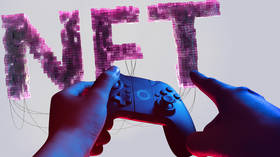Yanis Varoufakis slams NFTs and P2E games
In a sitdown with Crypto Syllabus, former Greek minister of finance and Valve economist Yanis Varoufakis shared his professional opinion on the rise of cryptocurrencies, NFTs, video games based around play-to-earn (P2E) mechanics, and Mark Zuckerberg’s developing metaverse.
Having worked for a time as an economist at Valve, the company behind gaming platform Steam, Varoufakis noted the similarities between Zuckerberg’s metaverse and the long-standing gaming industry.
“Today, a decade later, it is clear that gaming communities like the one I studied at Valve have been operating as fully fledged metaverses, to use Zuckerberg’s term. Gamers were drawn to them by the game, but once inside, they stayed to live out a large part of their life, making friends, producing goods for sale, consuming entertainment, debating,” Varoufakis noted. “Zuckerberg’s ambition is to insert his billions of Facebook non-gamer users into a Steam-like digital social economy complete with a top-down platform currency that he controls. How can I resist the parallelism with a digital fiefdom in which Zuckerberg dreams of being the techno-lord?”
He also noted that the concept of NFTs is really nothing new, and that over a decade ago Valve users were already assigning value to certain digital assets in online games, sometimes trading them on sites like eBay for thousands of dollars.
“Team Fortress 2 (or TF2) players were obsessed with digital hats. Initially part of free drops, some hats that were discontinued later became collectibles. Players began bartering within the game (e.g. I will give you two laser guns for this one hat of yours). Then, when the demand for some hat rose sufficiently, the players would step out of the game, meet up on eBay, trade the hat for (sometimes) thousands of dollars, before, finally, returning to the game where the vendor would hand the hat over to the buyer.”
Speaking of the similarities and differences between NFTs and digital assets in games, Varoufakis noted that while NFTs cut out any companies and allow digital assets to emigrate from where they were created to any digital realm, they offer nothing new within digital worlds other than “turbocharging the ideology of capitalism.” He also noted that in the real world, NFTs offer nothing but bragging rights to those who care for them, ultimately proving no challenge to the existing structure of property rights which upholds “the oligarchy’s exorbitant power over the many.”
The economist also shared his thoughts on play-to-earn games, seeing them as a continuation of what people did a decade ago, making money by creating digital content for popular games.
“When I worked with Valve, ten years ago, there were thousands of young people in China, in Kazakhstan, and elsewhere making a mint out of providing services to members of Valve’s gaming communities,” Varoufakis said. “Gifted players made good money paid by other players keen to watch them play. So, there is nothing new to the idea of a parallel economy that allows people in poorer countries or regions to earn as they play, or from offering in-game services.”
Varoufakis added that it is a good thing for someone living in China to make $60,000 a year designing digital goods instead of slaving away at a sweatshop, but he warned that unless “we have robots working for all of us so that we can reproduce the material conditions of our lives,” which would serve all of humanity and not just the 1% of the 1%, the idea that people should play games to earn a living is “the apotheosis of misanthropy.”
Finally, speaking of the dangers posed by cryptocurrency and surrounding technologies, Varoufakis said that while the environmental costs are huge, he feels that there are much more worrying aspects to the technology. “Even if there existed a magic wand whose waving would make blockchain run on zero watts, cryptocurrencies would remain more of a problem than a solution,” he said. “Within our present oligarchic, exploitative, irrational, and inhuman world system, the rise of crypto applications will only make our society more oligarchic, more exploitative, more irrational, and more inhuman.”
You can share this story on social media:








Comments are closed.